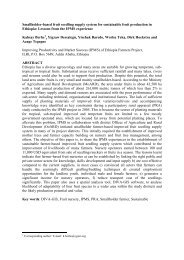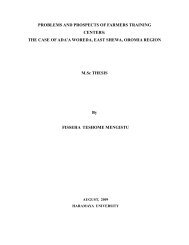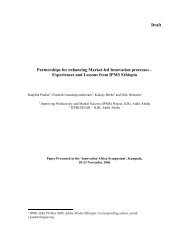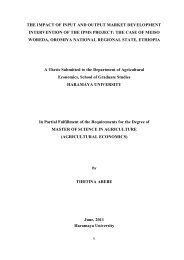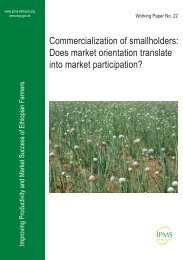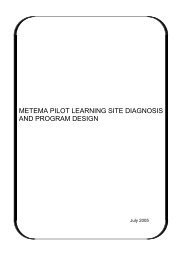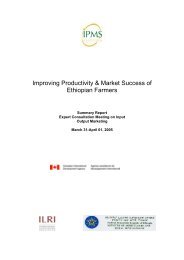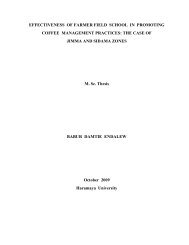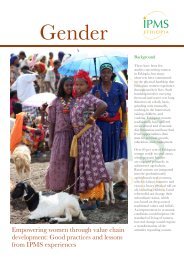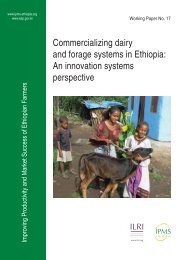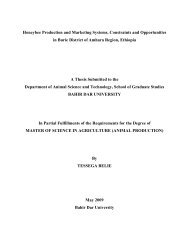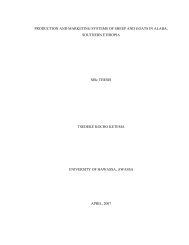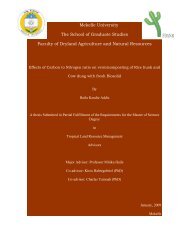FTCs were planned to be established throughout the country (Habtemariam, 2007); one FTC<strong>at</strong> each PA which serves as, center <strong>of</strong> inform<strong>at</strong>ion, extension, demonstr<strong>at</strong>ion, place where<strong>modular</strong> <strong>training</strong>s are given, source <strong>of</strong> advice for the transfer <strong>of</strong> improved technologies,knowledge acquisition, area <strong>of</strong> linkage between research, extension and technology users, andother institutional support services (FDRE, 2001; Berhanu, 2006).Adult literacy r<strong>at</strong>e <strong>of</strong> Ethiopian popul<strong>at</strong>ion who can read and write and Human DevelopmentIndex were 36.3 % and 0.406 respectively (MoFED, 2009). Human Development Index is anindex measuring n<strong>at</strong>ional socio-economic development based on measures <strong>of</strong> life expectancy<strong>at</strong> birth, educ<strong>at</strong>ional <strong>at</strong>tainment and adjusted real per capita income. From primary to tertiarylevel accounts only 12.3 million (16.0%) <strong>of</strong> the total popul<strong>at</strong>ion <strong>of</strong> the country (St.Mary,2006). Literacy r<strong>at</strong>e is a key indic<strong>at</strong>or <strong>of</strong> development next to life expectancy <strong>at</strong> birth andfollowed by infant or child mortality r<strong>at</strong>e, per capita income, unemployment and security(Mesfin, 2009).Farmers are more likely to adopt new technologies and become more productive with the help<strong>of</strong> basic educ<strong>at</strong>ion and extension services. They will be better equipped to make moreinformed decisions for their lives and to be active participants in improving economic, socialand political dimension <strong>of</strong> development. Hence, rural youth are the <strong>farmers</strong> <strong>of</strong> the future andmost <strong>of</strong> them start farming <strong>at</strong> a very early age. In rural areas, especially poor <strong>farmers</strong>, accessto educ<strong>at</strong>ion is still much lower and the quality <strong>of</strong> non formal educ<strong>at</strong>ion is poorer and <strong>of</strong>tenirrelevant to their lives.Among eight Millennium Development Goals, eradic<strong>at</strong>ion <strong>of</strong> illiteracy can be achievedthrough <strong>training</strong>. Training is an essential str<strong>at</strong>egy by which skill and knowledge can beacquired, <strong>at</strong>titudes changed, motiv<strong>at</strong>ion and aspir<strong>at</strong>ion also could be accomplished. Several<strong>training</strong>s, especially <strong>modular</strong> and other non <strong>modular</strong> <strong>training</strong>s have been given to <strong>farmers</strong> inrural communities. At this time, Ethiopian government has been launched str<strong>at</strong>egies andimplementing directions to initi<strong>at</strong>e <strong>modular</strong> <strong>training</strong> <strong>at</strong> FTC level as a means to meet therequired level <strong>of</strong> knowledge. Hence, <strong>modular</strong> <strong>training</strong> is the main option within which thesolution is found. For the main purpose <strong>of</strong> <strong>modular</strong> <strong>training</strong> many FTCs have been established2
since 2004 in Ethiopia. Farmers were supposed to be trained through certain selection criteria.Hence, three development agents have been employed for each PAs, and modules have beenprinted and distributed to regions (MoARD, 2008).Effective <strong>modular</strong> <strong>training</strong>s can be delivered and successful achievements can be gained whenlinkage <strong>of</strong> different organiz<strong>at</strong>ions and stakeholders realized <strong>at</strong> different level <strong>of</strong> institutions.Local institutions are the main instruments <strong>of</strong> human resource development through <strong>training</strong>for sustainable development. In recent years, more <strong>at</strong>tention has been given to use newlyestablished FTCs where <strong>modular</strong> <strong>training</strong>s can be delivered for youth groups to increaseproduction and productivity by enabling them more skillful and knowledgeable producers. Itcould also take an additional responsibility to undertake farmer based research in the area <strong>of</strong>agricultural technologies. The research and extension department is charged with theresponsibility to support those needs through effective <strong>farmers</strong>’ <strong>training</strong> (Tsion, 2008).In Fogera, out <strong>of</strong> 27 rural PAs, 15 PAs had already established FTCs within which 7 PAs hadbeen delivered <strong>modular</strong> <strong>training</strong> <strong>at</strong> FTC level (DoARD, 2008). However, the <strong>effectiveness</strong> <strong>of</strong><strong>modular</strong> <strong>training</strong> and its continuity as a result <strong>of</strong> this intervention has not been assessed andevalu<strong>at</strong>ed in the study area. In line with such context, the idea <strong>of</strong> this research was needed.This study was aimed <strong>at</strong> analyzing the <strong>effectiveness</strong> <strong>of</strong> <strong>modular</strong> <strong>training</strong>s in the study area andexploring options to enhance their utility. As a result, therefore; it is possible to gener<strong>at</strong>einform<strong>at</strong>ion for policy makers and executive <strong>of</strong>ficials for an intervention th<strong>at</strong> can facilit<strong>at</strong>e the<strong>modular</strong> <strong>training</strong>s through m<strong>at</strong>erials and facilities provision, <strong>training</strong> need assessment,continual monitoring and evalu<strong>at</strong>ion starting from targeting until the certific<strong>at</strong>ion <strong>of</strong> trainees1.2. St<strong>at</strong>ement <strong>of</strong> the ProblemCapacity building is an essential dimension <strong>of</strong> development in general and <strong>of</strong> ruraldevelopment in particular for developing as well as developed n<strong>at</strong>ions. Level <strong>of</strong> living can beraised through quality <strong>of</strong> life. Quality <strong>of</strong> life is a component <strong>of</strong> the quality and quantity <strong>of</strong> thebasic physical, social and cultural needs <strong>of</strong> human beings including ability to do something3
- Page 1 and 2: EFFECTIVENESS OF MODULAR TRAINING A
- Page 3 and 4: SCHOOL OF GRADUATE STUDIESHARAMAYA
- Page 5 and 6: STATEMENT OF AUTHORFirst of all, I
- Page 7 and 8: ABBREVIATIONS (Continued)RAAKSSGSWH
- Page 9 and 10: ACKNOWLEDGMENTFirst and foremost le
- Page 11 and 12: TABLE OF CONTENTS (continued)2.5. E
- Page 13 and 14: LIST OF TABLESTablepageTable 1. Est
- Page 15 and 16: LIST OF TABLES IN THE APPENDIXAppen
- Page 17: 1. INTRODUCTION1.1. Background of t
- Page 21 and 22: undertaken. If institutions focused
- Page 23 and 24: panel discussion, conference, exper
- Page 25 and 26: 2. LITERATURE REVIEWIn this chapter
- Page 27 and 28: Figure1. Four Stages of the TIER Mo
- Page 29 and 30: Level 1: Reactions: At this level,
- Page 31 and 32: In 1963, agricultural extension was
- Page 33 and 34: stated objectives which involves co
- Page 35 and 36: trainees’ farm cooperation and co
- Page 37 and 38: Modular training was supposed to gi
- Page 39 and 40: achievement of a corporation purpos
- Page 41 and 42: e examined, defined and described b
- Page 43 and 44: FTCs are expected to play active ro
- Page 45 and 46: deficient in training skills, espec
- Page 47 and 48: 3. RESEARCH METHODOLOGYIn this chap
- Page 49 and 50: Figure 4. Map of the study Area (Fo
- Page 51 and 52: 3.2.2. Sample size and sampling pro
- Page 53 and 54: 3.2.3. Types and sources of dataTo
- Page 55 and 56: 3.2.5. Method of data analysisBased
- Page 57 and 58: Table 4: Profiles of respondentsNo
- Page 59 and 60: The data in the Table reveal that t
- Page 61 and 62: 4.1.3.3. Delivery of modular traini
- Page 63 and 64: also have not participated with ful
- Page 65 and 66: Table 8: Knowledge test of sample h
- Page 67 and 68: 4.2.2. PracticePractice was operati
- Page 69 and 70:
The responses of farmers were categ
- Page 71 and 72:
system. Actors’ interactions can
- Page 73 and 74:
FTCs and this project supports only
- Page 75 and 76:
4.3.5. Actor linkage matrixActor li
- Page 77 and 78:
According to actor linkage matrix;
- Page 79 and 80:
followed by projects, NGOs and rese
- Page 81 and 82:
may have access for information abo
- Page 83 and 84:
4.5.3. Lessons learned from better
- Page 85 and 86:
SWOT AnalysisStrength, Weakness, Op
- Page 87 and 88:
Opportunities• Participatory plan
- Page 89 and 90:
Practice was assessed based on trai
- Page 91 and 92:
with communication media, articles,
- Page 93 and 94:
BoARD and SWHISA (Bureau of Agricul
- Page 95 and 96:
IPMS (Improving Productivity and Ma
- Page 97 and 98:
Taddesse Mulugeta, 2007. Rural wate
- Page 99 and 100:
Appendix Table 1. Category of train
- Page 101 and 102:
Appendix Table 5: Extent of linkage
- Page 103 and 104:
3.2. What do you think about the ti
- Page 105 and 106:
4.5 Practice (Indicate whether you



